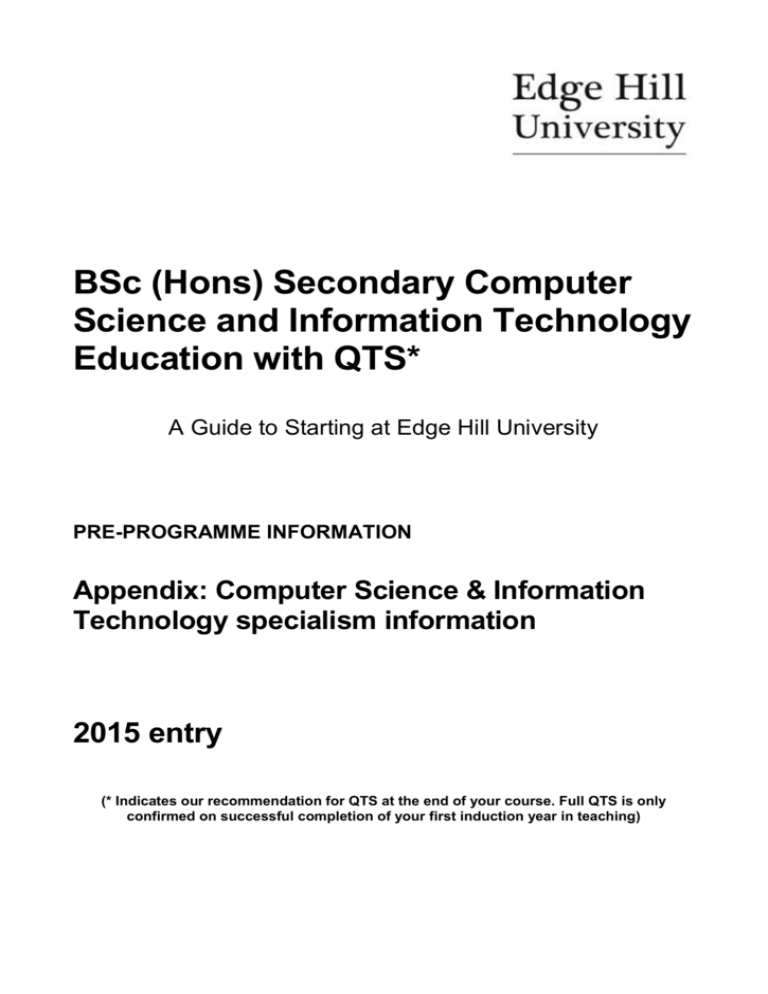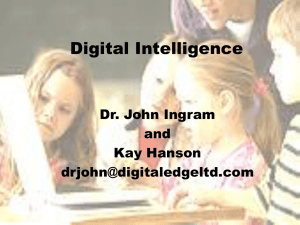Computer Science and Information Technology
advertisement

BSc (Hons) Secondary Computer Science and Information Technology Education with QTS* A Guide to Starting at Edge Hill University PRE-PROGRAMME INFORMATION Appendix: Computer Science & Information Technology specialism information 2015 entry (* Indicates our recommendation for QTS at the end of your course. Full QTS is only confirmed on successful completion of your first induction year in teaching) Dear trainee, Having met the majority of you at your interviews, I am now looking forward to welcoming you to Edge Hill University in September 2015 at the start of your course. I am sure you are all feeling excited and apprehensive about what is coming over the next few years. The most important thing is for you to keep me informed if you are having any problems about meeting any of the entry conditions attached to your offer in order that these can be sorted out quickly. You can reach me at hawkinsc@edgehill.ac.uk or 01695 657129. Computer Science & Information Technology is a very exciting area in which to be involved in our schools today and there is considerable demand for enthusiastic, highly motivated and highly skilled teachers who can ensure high quality delivery of the curriculum and external examination requirements. You will note that the curriculum area we now teach is Computing rather than ICT. Of course the development of Computer Science & Information Technology capability within a school will vary according to the resources that the school is able to make available for the purchase of hardware and software. However Information Technology (IT) has a significant role across the curriculum. Most teachers in school now use IT to aid lesson planning, administration and teaching and learning. The majority of schools have interactive whiteboards and these are used both for teacher demonstration and pupil input. Whilst you are training, and as a newly qualified teacher, you will play a key role in ensuring that the Computing experience that both pupils and staff receive is relevant and of a high standard. Claire Hawkins Course Leader Outline of course content The following is an outline of modules you will study. In addition we reserve the right to substitute modules to reflect the rapidly changing needs of Computer Science & Information Technology in school or as a result of trainee feedback. You will be provided with an up to date list of modules annually. It is not intended to enter into the precise detail of module content but you should be aware that course modules can be assessed by combinations of assignments, examinations, essays, presentations, reports, logs, portfolios, audits and observation of your teaching. In addition you will have to meet the Teachers’ Standards required to become a teacher. This will be explained to you in more detail when you come for the induction week. Year 1: Subject Knowledge modules: Computer Architecture Programming Essentials Programming: Concepts to Construction Web Design and Development Teaching Skills: Principles, pedagogy and planning in Computer Science & Information Technology Personal and Professional Conduct – Transition to Higher Education and the Teaching Profession Professional Practice 1a Year 2: Subject Knowledge modules: Introduction to Databases Programming Languages: Theory to Practice Programming Languages: Inspiring Creativity Teaching Skills: Creative medium term planning and teaching in Computer Science & Information Technology Personal and Professional Conduct – Legal Requirements for Professional Practice Professional Practice 1b Year 3: Subject Knowledge modules: Mobile Application Development Internet Security Big Data Teaching Skills: Classroom assessment and target setting skills for pupil progress in Computer Science & Information Technology Personal and Professional Conduct - Employability Professional Practice 2 Some Key Staff. The following details will provide you with names and contact numbers should you have any difficulty with any aspect of the course prior to starting in September. Please be aware that I will be taking leave in late July and various dates in August. However other members of the department will be available if you ring the department phone and I will be looking at my email from time to time. Secondary Undergraduate CS&IT Course Leader Claire Hawkins e-mail: hawkinsc@edgehill.ac.uk Phone: 01695 657129 Secondary Undergraduate Year 1 Leader Shirley Hindley e-mail: hindleys@edgehill.ac.uk Phone: 01695 657829 Secondary Undergraduate Programme Leader Dr Gordon Laing e-mail: laingg@edgehill.ac.uk Phone: 01695 650833 Pre – Course Activities. 1. It would be very useful to spend some time in a secondary school; we would generally recommend 10 days for those starting Year 1. The idea would be to observe teaching as conducted by established professionals and generally soak up the atmosphere of the school. At any time of year schools are very busy so they might welcome an extra pair of hands but you also should be aware that teachers may not have a great deal of time to talk with you. The aim is for you to be very clear about the demands made on Computing teachers and the experience will enable you to start seeing where there are gaps in your subject knowledge that need to be addressed. 2. Consider your past experiences in the classroom as a pupil/student or a teacher or a combination of both. Jot down some observations, which in your view represent instances of good and not so good teaching practice. You might like to conduct a similar exercise to highlight what you consider to have been good and not so good lessons. However whilst you may question a member of staff on aspects of the lesson be very careful not to imply any criticism. 3. Download a copy of the GCSE and A Level syllabuses from the examination board websites (www.aqa.org.uk; www.edexcel.org.uk; www.ocr.org.uk) and use these with the Subject Knowledge Audit (at the end of this document) to identify topics that you might need to learn more about. A similar audit will be used throughout your course to track your progression and identify any areas of knowledge which need to be addressed. Complete the audit electronically and bring this with you when you start University in September; it will be used during your tutorials. Pre – Course Reading. Once you have started your course you will be given a full reading list – in the meantime it would be beneficial if you could: look at one or two of the many revision guides published by Letts or Macmillan or look at GCSE /GCE revision sites on the Internet read through the core text Simmons, C. and Hawkins, C (2015) Teaching Computing. London: Sage Publications (Available Summer 2015) keep up-to-date with current educational issues through sites such as www.tes.co.uk or www.bbc.co.uk. I would like to wish all of you taking examinations this summer the very best of luck and that you do as well as you hope. Best wishes Claire Hawkins Secondary Undergraduate CS&IT Course Leader Computing Needs Analysis 1.4 Creating and Sharing Content 1.5 Gaming 1.6 Using ICT for Learning Finding, Retrieving and Validating 1.7 Information 1.8 Impact of ICT on Society 1.9 Scope, Scale and Nature of ICT Evolution I have little or no understanding of this concept Topic Area Digital Literacy Online Identities Social Networking Digital Communication I understand this concept Subject Ref Number Section 1 1.1 1.2 1.3 I could explain this to others This Subject Knowledge Audit is designed to help you self-assess your Computing subject specific knowledge for teaching Key Stage 3. Please tick the box that best describes your current position next to every bullet point. For any areas which are not ticked in the ‘I could explain this to others’ column, provide details of how you intend to supplement and develop your subject knowledge for this area. Action Required Section 2 2.1 2.2 2.3 2.4 2.5 2.6 2.7 2.8 2.9 2.10 2.11 2.12 Digital Skills Digital communications Communications online Producing Media Editing Media CAD Modelling Games Spread sheets Control Data Logging Programming Problem Solving Section 3 3.1 3.2 3.3 3.4 3.5 3.6 3.7 3.8 3.9 3.10 3.11 Technology in the World Business Software Industry Applications Programming to solve Problems Transferrable Skills Collaboration Web Design Creative industries E-Commerce Work related learning/training ICT Specific Jobs ICT Based Jobs Evolution and Impact of work 3.12 practices/tools Section 4 4.1 4.2 4.3 4.4 4.5 4.6 4.7 4.8 4.9 4.10 4.11 Technical Understanding Electronic Devices Networks Data Storage Programming Algorithms Game and Apps Creation ICT Systems Life Cycle Systems Design User centred Design Embedded Systems Industry Standards 4.12 Organisation of Data and Data Standards 4.13 Evolution and Impact of Computing Section 5 5.1 5.2 5.3 5.4 5.5 5.6 5.7 5.8 5.9 5.10 Safety, Security and the Law Respect and Etiquette Responsible Use Online Safety Offline Safety Health and Safety Legal Issues Copyright Data Protection Hacking Environmental Issues



